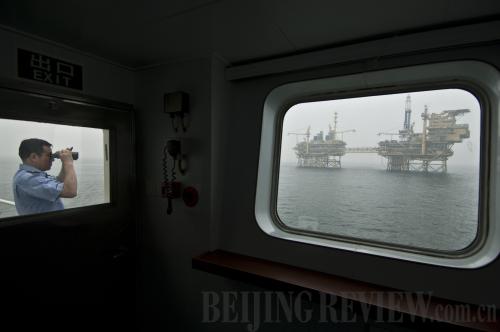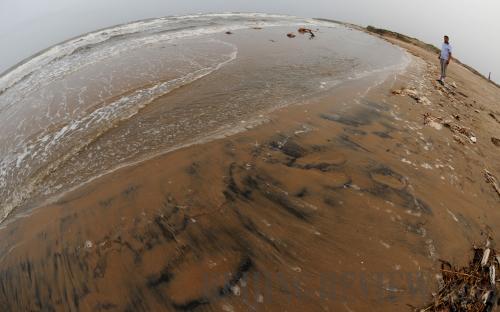|
 |
 |
|
OVERSIGHT: A crewmember of a Chinese maritime surveillance ship observes Platform B of the Penglai 19-3 Oilfield on July 15 (GUO SHELEI) |
MARINE POLLUTION: The presence of oil, allegedly leaked from the Penglai 19-3 Oilfield, is evident on the beach of Laoting County, Hebei Province, on July 25 (GONG ZHIHONG) |
Yang, head of the association, said in summer the ocean current flows from Laoting in the direction of Hebei's Qinhuangdao City and Liaoning's Suizhong County where oil particles from the Penglai 19-3 Oilfield had been found. "If the particles did not pass Laoting first, how did they get to the other two places?" Yang said.
"Moreover the SOA's samples were taken from the Laomigou area, where there are only three scallop-raising households, while 97 percent of the scallop farmers are concentrated in the Langwokou area," he said.
Fishermen in Laoting have decided to file lawsuits against ConocoPhillips China at a local court.
Meng Xiaojuan, a lawyer from the Yingke Law Firm that represents 160 of scallop farming households in Laoting and neighboring Changli County, said the farmers' losses were estimated at up to 1 million yuan each.
"The fishermen plan to sue ConocoPhillips China for compensation. Their main challenge will be to prove oil leaked from the Penglai 19-3 Oilfield caused the death of their scallops," said Yang Yang, a project manager at Friend of Nature, a Beijing-based environmental NGO.
Compensation claims
The massive oil spill, however, has done damage to more than just fishermen's livelihoods. Oil has contaminated a vast area of the Bohai Sea, doing considerable damage to its ecosystem.
"Because the Bohai Sea is a semi-enclosed sea where water circulation is poor, pollution here can do more harm than in an open sea," said Guo Mingke, deputy chief of the SOA's North Sea Branch.
The SOA said on August 16 it was going to sue ConocoPhillips China for the contamination wrought by oil seepage from its rigs and it had begun to recruit a legal team to pursue claims against the company.
"As the full extent of the damage is still to be assessed, the amount of compensation demanded has not yet been decided," the SOA said.
China's Marine Environmental Protection Law, which has been in force since April 2000, stipulates, in the case of damage caused by offshore oil spills, the polluter should be fined between 30,000 yuan ($4,695) and 200,000 yuan ($31,298).
But SOA officials admit the paltry fine is insufficient compensation for the damage caused by oil spills, as pollution to the marine environment usually affects a relatively large area, and often has a severe and lasting impact.
Last summer, British Petroleum (BP) set up a $20-billion compensation fund after the deepwater oil spill in the Gulf of Mexico. Hundreds of lawsuits have been filed against BP, including suits from families of the dead workers, business owners across the Gulf of Mexico and class-action lawsuits covering environmental damage.
China's Marine Environmental Protection Law does state, in addition to fines, oceanic authorities shall sue for damage to maritime ecology on behalf of the country, said Wang Bin, Deputy Director of the SOA's Marine Environment Protection Department. "I believe that the amount of compensation will be much larger than 200,000 yuan," he said.
Shandong has a local regulation specifying the maximum amount of compensation that can be demanded in cases of marine ecological damage is 200 million yuan ($31.29 million).
But there is no such law at the national level. "The Marine Environmental Protection Law has no clearly defined section covering marine ecological damage, which creates trouble for judicial departments," said Liu Jiayi, a researcher with the SOA's Institute for Ocean Development Strategy.
Although recent years have seen a number of oil spills take place off China's coast, only in a few instances maritime authorities claimed compensation for marine ecological damages.
The Tasman Sea case was the first one. On November 23, 2002, Maltese crude oil tanker Tasman Sea collided with a Chinese vessel off the coast of Tianjin. Leaking oil from the tanker polluted the Bohai Sea.
The Tianjin Oceanic Bureau brought a lawsuit in the Tianjin Maritime Court, seeking compensation for damages to the marine environment caused by the spill. However, the damages awarded in the case were much less than the bureau had hoped.
A key factor behind the low damages was China's inability to effectively evaluate and quantify losses to its marine environment. "As a result, the evidence presented was inadequate, and compensation was made for losses to environmental capacity, but not for other losses to marine ecology," said Beijing-based lawyer Xia Jun.
"Quantifying marine ecological damages is a conundrum," said the SOA's Liu.
The Tasman Sea case prompted the SOA to publish the Guidelines for Evaluation of Environmental Losses Due to Maritime Oil Spills in 2007.
"Yet whether the document will be accepted in court and by defendants is still unknown," Liu said.
Liu suggested China's top legislature amend the Marine Environmental Protection Law as soon as possible.
He said liable parties should establish a special fund to cover the cost of pollution clean-up and control, as well as environmental restoration and management, in the event of an accident.
For ecological damage in cases where the victims and liable parties are not identifiable, Liu said any party engaging in economic activities at sea should be asked to pay insurance against damage to the ecological environment before beginning operations.
| 